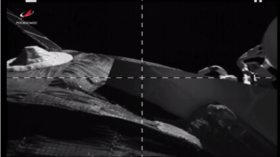‘Stuck in traffic’: Soyuz manned by Russian robot Fedor docks at ISS on 2nd attempt

The unmanned Soyuz MS-14, carrying supplies and Fedor, a humanoid robot, has successfully docked at the International Space Station (ISS) after the first attempt went awry due to a technical glitch.
The docking went off without a hitch early on Tuesday morning Moscow time (03:08 UTC) as space enthusiasts around the world watched Fedor’s second shot at docking at the ISS.
The mission was initially scheduled for Saturday but was aborted after a rendezvous system, known as Kurs, malfunctioned.
On a manned mission, the crew can take control and dock manually in such circumstances, but Fedor was unable to steer the spaceship on his own.
READ MORE: ‘He feels good’: Humanoid robot Fedor safe despite ISS docking abort in space
The ISS crew had two days to fix the flaw. They did so by relocating the Soyuz MS-13 spacecraft that was already at the station to another dock, thus freeing a fully functioning dock for Fedor’s second try on Monday night.
Fedor later joked and apologized for being late on Twitter.
Прошу прощения за задержку. Застрял в пробке. Готов к продолжению работы. pic.twitter.com/iR277q5Mxo
— FEDOR (@FEDOR37516789) August 27, 2019
“I apologize for the delay. Stuck in traffic. Ready to continue working,” he wrote.
Also on rt.com ‘US concerned about our good ties with Europe’: Cosmonaut says pressure forced ESA to ditch SoyuzWhile Roscosmos decided to replace the dock rather than to fix it in a rush, Rogozin said that the Kurs rendezvous system would undergo necessary repairs before the next manned ISS mission on September 27.
Fedor, meanwhile, should brace himself for new endeavors. Rogozin said that the humanoid robot may travel to the ISS aboard a next-generation piloted spacecraft, possibly the ‘Federation’ project that is currently in the works. Its first launch is planned for 2022.
The #SoyuzMS14 spacecraft docked to the Zvezda module of the International Space Station. The crew is now preparing to open the hatches. The Soyuz ship delivered about 670 kg of dry cargo to the ISS pic.twitter.com/GWzO1vyoLK
— РОСКОСМОС (@roscosmos) August 27, 2019
Fedor is set to take part in “about five or six scientific tasks” that for now are shrouded in secrecy. He is supposed to stay at the ISS until September 6.
Formally known as Final Experimental Demonstration Object Research, the robot is about 190cm (6.2 feet) tall and weighs some 160kg (350 pounds).
Subscribe to RT newsletter to get stories the mainstream media won’t tell you.














